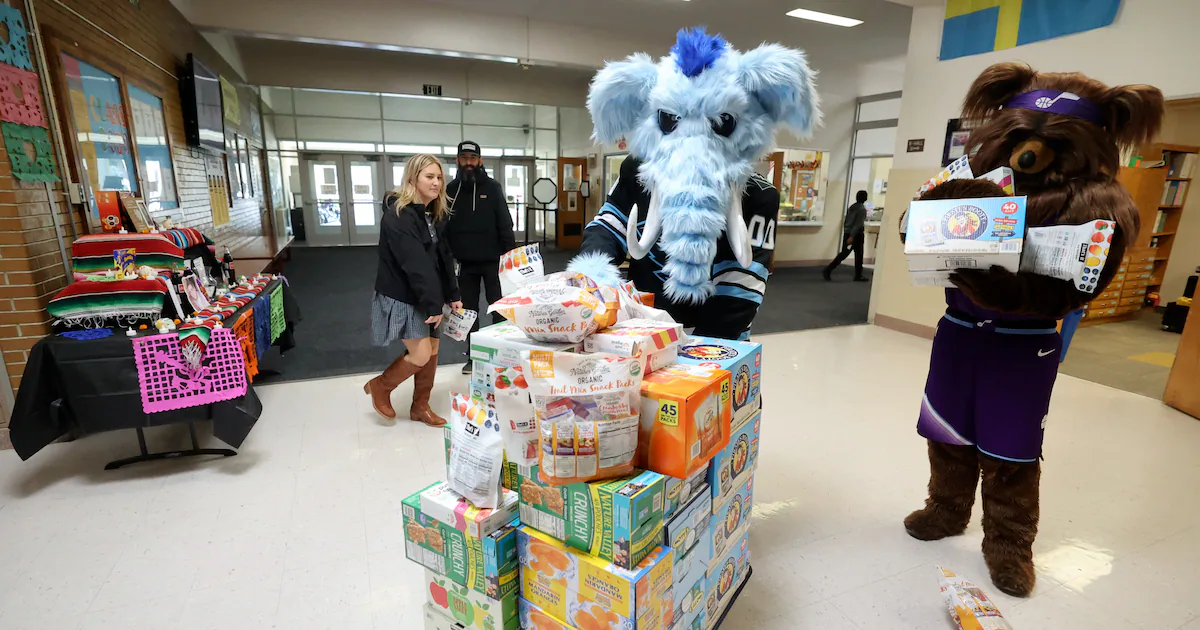Copyright Salt Lake City Deseret News

While Tusky the Utah Mammoth mascot and the Jazz Bear were goofing around on the playground with students at Lincoln Elementary School in South Salt Lake on Thursday afternoon, the adults were inside having a serious conversation about hunger. That’s a very real topic this week with news that low-income families will not receive their usual food stamp allocation Nov. 1 because of the government shutdown. At the same time, some of Utah’s child nutrition programs are facing deficits and there’s a great risk that children will be hungry unless something is done to help them. So representatives from various businesses, state government, philanthropy and the nonprofit sector teamed up to donate $250,000 to those nutrition programs. And they’re hoping to raise more in the wider community as they encourage others to get involved. The donors include Ryan and Ashley Smith, owners of the Utah Jazz and Utah Mammoth and co-founders of the SEG Foundation, Utah House Speaker Mike Schultz and his wife Melissa Schultz, The Policy Project, Instructure, Lincoln-Hill Partners, Lincoln and Reagan Shurtz, Jeremy and Kristin Andrus through their Andrus Family Foundation, Vess and Angie Pearson and their Giving Fund, EM Founders Group, Factory for Good and the Boon Foundation. The pain of hunger A news release announcing the donation said the money “will immediately support school districts facing meal program deficits, helping stabilize budgets and ensuring Utah students at risk of going without will continue receiving safe and nutritious school meals. Currently, 1 in 6 Utah children experiences hunger, and many school nutrition programs are stretched thin as food costs rise and budgets shrink.” In person, they told stories of their own encounters with hunger and with hungry people. The school principal, Milton Collins, said he grew up in poverty and knows the pain and pangs. Because he sees with that lived-experience lens, he noted that the needs of the kids are something he sees especially clearly and “my heart bleeds for them.” Kristin Andrus described visiting homes where food is often scarce. As she got to know hard-working families who struggle, she said SNAP benefits became a deeply personal topic to her. Hearing plans to suspend SNAP benefits because of the shutdown and knowing tens of thousands would lose benefits, “I felt sick,” she said. Food stamps are a “lifeline for families who are working hard, they are doing their best, and they just need a bridge through tough times,” she said. “It’s not about politics. It’s about children,” she added, noting the community needs to show up with money, food, help and advocacy. “Feeding kids is not a debate. It should be our shared responsibility and our shared joy.” Emily Bell McCormick, founder and president of The Policy Project, which will oversee distribution of the funds, deemed the effort a “call to action” for the entire state. The antidote to problems, she noted, “is doing something.” She pointed out the urgency with stories she’s heard and sometimes witnessed. A principal in the Granite School District told her of seeing a child put the mashed potatoes on his lunch tray in his pocket. Asked about it, he said he was taking it home to his sister, so she’d have food. Among other anecdotes, she told of a child in Weber County eating dog food because it was available. A call to action Details of how the money will be distributed are being worked out, but McCormick said eight school districts will benefit, including Granite, Salt Lake and Weber, as well as several others, some rural. Each will receive at least $25,000 to abate hunger. As for the call to action, Schultz seems hopeful. While he said it’s clear that kids can’t be hungry and thrive, he believes that Utahns will help out. “Our kids are everything to the state of Utah,” he said. “Utah’s No. 1 asset and resource.” He also called it “a bit frustrating” when politics get in the way and kids are hurt by decisions, which he deemed “not acceptable.” The donation, he said, “isn’t just a number on a check. I believe it’s a promise. It’s a promise that a child can focus on learning instead of being hungry. It means students can walk into class ready to learn and grow. It means our kids have the opportunities to dream a little bit bigger. It’s about giving our kids and every student a chance to succeed.” Mike Maughan, a Smith Entertainment Group executive, also heralded Utah as “an amazing place, a place where people show up for each other.” And one thing everyone can agree on, he said, is “that no child should go hungry. Utah has always been a state where people come together, from our food pantries to community-led libraries to volunteer youth programs. Utahns don’t wait to be asked.” The Policy Project helped the Utah Legislature pass HB100 earlier this year, expanding access to no-cost school meals. It will now oversee distribution of the funds to the local education agencies to make sure as much need is met as possible. Besides tackling student hunger, the Policy Project’s legislative initiatives have also provided period products in every Utah school, built Teen Resource Centers in 86 high schools to help vulnerable students, expanded child sexual abuse prevention education to K-6 students and limited distracting cell phone use in classrooms.



